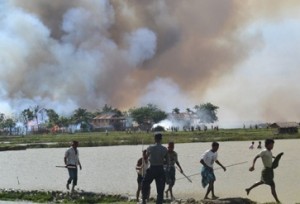Two-Child Policy in Arakan State: Latest Act of Ill-treatment, Unlikely to be the Last
By Burma Partnership • May 28, 2013 Last week, Arakan State officials, following recommendations from the internationally-rejected 186-page report of a government-appointed commission, announced a mandatory two-child policy to ‘help ease tension’ in Buthidaung and Maungdaw provinces where the majority of the population is Muslim. A year after two bouts of violence in Arakan State, this two child policy, that applies predominantly to the Rohingya population, is perhaps the most obvious outline of potential ethnic cleansing that many have voiced their concerns about, most noticeably in the last Human Rights Watch report. “The state government is trying to use the Rakhine investigation recommendation, which is outrageous, to justify a policy of limiting births of Rohingya,” said Phil Robertson, Asia deputy director of Human Rights Watch.
Last week, Arakan State officials, following recommendations from the internationally-rejected 186-page report of a government-appointed commission, announced a mandatory two-child policy to ‘help ease tension’ in Buthidaung and Maungdaw provinces where the majority of the population is Muslim. A year after two bouts of violence in Arakan State, this two child policy, that applies predominantly to the Rohingya population, is perhaps the most obvious outline of potential ethnic cleansing that many have voiced their concerns about, most noticeably in the last Human Rights Watch report. “The state government is trying to use the Rakhine investigation recommendation, which is outrageous, to justify a policy of limiting births of Rohingya,” said Phil Robertson, Asia deputy director of Human Rights Watch.
This policy announcement also marks the government’s first ‘official’ act of segregation since the outbreaks of violence that displaced as many as 125,000 Rohingya. From burning of mosques, targeted attacks on Rohingya families, denial of identity, and the implicit support of the 969 anti-Muslim campaign, now comes population control. It is unlikely to stop. This time it’s clearer than ever that the government is backing the agenda behind a campaign against the Muslims in Burma. Win Myaing, a Rakine State spokesperson said that the Rohingya population in the area is growing ten times faster than the Buddhist Arakanese and is one of the causes of the tension. Although population pressure on scarce socio-economic resources in the area should be taken into consideration, this policy serves only one purpose – defeat of the ‘unwanted’ Rohingya population.
For Burmese people, or Burmese Buddhists in particular, there is a culture that fears the growth and influence of Islam, or generally dark-skinned people whom they call “Kalar”, a derogatory term for those of South Indian descent. Islam is seen as the biggest threat to the existence of Buddhism. Many Buddhists are manipulated to believe that the number, “786,” that is written above many Muslim-owned businesses, is a code for a 21st century takeover by Islam if the numbers are added individually. Many have been motivated to join the 969 campaign based on the idea of countering the Islam’s 786 sign. There will not be a peaceful coexistence between the two religious communities in Burma until the extremists learn to accept that Islam is not a threat and that violence is not a way to react even if they can’t help but feel it as a threat.
Despites these horrifying incidents and situations, the desire of large parts of the Buddhist population to co-exist peacefully with Muslim communities through mutual understanding exists, noticeably among the young and open-minded. Two weeks ago, a statement signed by 48 Burmese grassroots organizations and networks, some of which have initiated interfaith campaign activities, was released. The statement denounced all individuals and organizations committing and contributing to the violence. It called for the enforcement of the rule of law, equal rights, and justice for the victims. This movement has grown and whether it will continue to develop strongly in the future depends on how prepared they are to respond to the reaction from government-assisted anti-Muslim actions and policies such as this newly imposed two-child policy.
There is hope but there is reality. These anti-Rohingya and anti-Muslim movements will not stop anytime soon. It was flawed in the first place as the investigation commission lacked any representation from the Rohingya and did not comply with international human rights standards. Now we see systematic segregation and persecution of one of the most vulnerable groups in Burma. The government must realize that they have the responsibility to protect all peoples within its state borders as an international obligation and must therefore revoke this policy immediately.
Tags: Arakan/Rakhine, Burma Partnership, Muslims, Rohingya, Two-child policyThis post is in: Blog
Related PostsMyanmar: Free Prisoners of Conscience in Rakhine State End Ongoing Persecution of Rohingya
UN Myanmar Rights Expert: Backtracking on Democratic Space Gains Momentum in Election Year
Myanmar’s Proposed Race and Religion Laws are Discriminatory and should be Scrapped
The FCO’s Human Rights Work 2013
BROUK Welcomes US Senate Resolution on Rohingya









 All posts
All posts